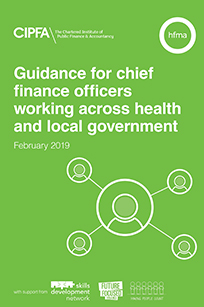Integration: finance frontrunner
 There are many examples of innovative health and social care in the Greater Manchester devolution area, but Kathy Roe stands out as a true pioneer. For not only is she chief finance officer at Tameside and Glossop Clinical Commissioning Group, but she also fills the same role at the local authority, Tameside Metropolitan Borough Council.
There are many examples of innovative health and social care in the Greater Manchester devolution area, but Kathy Roe stands out as a true pioneer. For not only is she chief finance officer at Tameside and Glossop Clinical Commissioning Group, but she also fills the same role at the local authority, Tameside Metropolitan Borough Council.
Ms Roe, the 2018 HFMA Finance Director of the Year, is part of a joint management team covering all the council and CCG responsibilities, from commissioning healthcare to ensuring the bins are collected and setting council tax. The decision to take such a radical step sprung from this vision of a new way of working, she explains.
‘The council is quite a traditional organisation, steeped in history – the last reorganisation of councils was in 1972. Bringing the council and CCG together is like two oceans coming together, it’s challenging but we are finding our way through. We are trying to adapt both organisations – it’s not a merger or a takeover, it’s creating a new way of working.’
She continues: ‘What’s the art of the possible? It gives us permission to have a go at something different. We are all looking at system-wide issues and you can’t resolve system-wide issues on your own. We can share each other’s risks and benefits. All three organisations – the CCG, the council and the hospital – could see that individually they could not manage demand, so they asked how they could work together to do things differently.’
However, collaboration did not happen overnight. A joint vision, Care together, set out the strategy four years ago. Initially, Care together focused on providers and ensuring services are delivered to patients in a less fragmented way and closer to patients’ homes.
‘The key things are relationships, trust and leadership. If you can get all three things right, then anything is possible, Ms Roe says. ‘When one organisation has a risk, the others try to understand it and on many occasions we have realised that one of the organisations is doing something that is impacting negatively on another.’
An example of this happened when the council cut its spending on provision for the homeless. ‘After a few weeks, the hospital chief executive was asking why she suddenly had so many people taking beds overnight who she could not discharge. It was happening because homeless people were ending up in the hospital, as they had nowhere else to go. So, we changed our policy because it’s better to spend £20 a night putting people in a bed and breakfast than £200 when they are needlessly in a hospital bed.’Collaborative effort
The commissioners then realised they should also work more collaboratively. ‘We soon concluded we couldn’t leave the commissioner side as it was – if the provider side is working together, commissioners should become more joined up also.’
The CCG and council agreed to a joint management structure, with the council chief executive also becoming the CCG’s accountable officer and, following her initial role of being responsible for health and social care from January 2016, Ms Roe took up the dual role of finance lead across both the CCG and local authority from October 2017. This puts her in a small group of finance professionals in dual roles.
The council’s section 151 officer – its chief finance officer – had just retired, opening up the opportunity across both roles. ‘The council brought in an interim section 151 officer for me to shadow for 12 months because we had to understand if it would work both for myself, the local authority and the CCG. The interim helped to show me the ropes and it was a real help as I don’t think you could step into this role without some background. It’s a huge job, but very rewarding as you have influence across the system.’
As well as learning the intricacies of local government finance, she learnt about the role of the section 151 officer. ‘Councils have to appoint these officers, who have a fiduciary duty to the local taxpayer to safeguard the public purse,’ she explains. By law, councils must also set a balanced budget.
‘If you think there’s any chance of unlawful spending or the budget won’t balance you have to issue a formal report to the members of the council. It’s a more independent role than in the NHS – a bit like being an auditor – although you are a council employee.’
There are challenges in creating a single management team, including ensuring its governance is right. The council and CCG remain separate statutory bodies, producing their own accounts and operating under their own financial regimes. Their work has been brought together under the umbrella of a strategic commissioning function with a joint board, which can make decisions on pooled section 75 funds. However, other spending decisions can only be taken by the CCG or the council.
This causes frustration and Ms Roe has been involved in talks with government on how to remove these barriers. ‘For example, surgical work commissioned by the CCG cannot be included in section 75 budgets – 65% of CCG spending can be on secondary care and a lot of that will be on surgical procedures. Also, other areas such as safeguarding arrangements and emergency ambulance expenditure cannot be included,’ she says.
‘Overall, the commissioning function has a single integrated commissioning budget, but we have to separate out three pots when we report and make a clear set of decisions around each of the three pots. The first pot is section 75 funds, which make up about 50% of the overall money. The second largest pot is an aligned fund, accounting for around 40% of the budget, which we can take into the commissioning board for an opinion, but any decisions have to be ratified by the executive committees of the CCG or council.
‘The third pot is the delegated primary care budget – the remaining 10% – which comes from NHS England. Legally, the CCG can’t double delegate to another body, so the strategic commissioning board does have a say, but it’s up to the CCG governing body to approve it.’
Her dual role is largely strategic. ‘There’s no way I could get into all the detail. Obviously, I have a good handle on the health side, and almost every day I learn something new on the council side – it’s such a complex and diverse organisation, from bin collection to schools to exchequer services or council tax – each one is so complex and testing.’
But finance staff are well-suited to adopting this higher-level role, says Ms Roe, who is also deputy accounting officer at the CCG. ‘All your training in finance, leads you to getting involved in other parts of the business. You are wasted if you are only looking at the numbers – you have to make things stack up and that’s the way you apply yourself when looking at a problem, whether numbers are involved or not.’
She would not be able to do the job without her team, she says, especially deputy finance directors Tracey Simpson and Tom Wilkinson, who look after health and local government finance, respectively.
 How does she divide her time between council and CCG work? In many ways, she sees it as one, integrated job, though there are times when the local authority or the CCG will have to take precedence. For instance, council budgets must be agreed by the end of February and, when we spoke, she was preparing to present a detailed budget report to the council’s executive cabinet. Once the budget has been agreed by the full council, the budgeting focus will turn to the CCG in early March. Once the CCG budget has been signed off, the strategic commissioning board will then agree spending plans by the end of March.
How does she divide her time between council and CCG work? In many ways, she sees it as one, integrated job, though there are times when the local authority or the CCG will have to take precedence. For instance, council budgets must be agreed by the end of February and, when we spoke, she was preparing to present a detailed budget report to the council’s executive cabinet. Once the budget has been agreed by the full council, the budgeting focus will turn to the CCG in early March. Once the CCG budget has been signed off, the strategic commissioning board will then agree spending plans by the end of March.
Staff, clinicians and councillors accept that she cannot be in every meeting and has to prioritise, which is again where able deputies step in. ‘You need a good support system behind you,’ she says.
This fits with her philosophy of licensing staff to take on new responsibilities. ‘I want to empower staff. If you want to develop, if you want to learn and you are showing me you are committed, I will empower you. I want everyone to feel empowered and to take on whatever roles they can.’
The strategic commissioning function has a single, integrated and co-located finance team, which covers the CCG and council services. Some groups of staff focus solely on CCG or local authority matters, but others work system-wide, such as on continuing healthcare or the Better Care Fund. The aim, as far as possible, is to identify single budget-holders who currently get two budget statements and try to turn that into a single statement. The team is also pulling together integrated standing orders, scheme of delegation and a risk register.
Currently, council staff are providing back office functions – communications, engagement, payroll and human resources, for both local authority and CCG. Tameside and Glossop Integrated Care NHS Foundation Trust provides IT to the CCG, but there are plans for the trust’s IT team to co-locate with their council peers later this year and offer services to all three organisations.
The biggest issue in bringing the finance teams together is that council and CCG are on different finance systems. While CCGs are mandated to use the national ledger system provided by NHS Shared Business Services, councils are free to choose their own. ‘I have an ambition to get all our expenditure onto one ledger,’ says Ms Roe, ‘which would be the council ledger as it has more functionality – the SBS one is more prescriptive.’
The national CCG ledger has set rules for a reason – it ensures consistency in the description of spending across all CCGs and allows NHS England to pull off reports at the touch of a button, for example. Ms Roe’s plan would not exclude Tameside from contributing to this – data from the joined-up local ledger could be downloaded into the SBS system every month, she says. ‘It will take some doing but I think it’s the next natural step we need to get to.’
Many chief finance officers will wonder how Ms Roe fits in all her responsibilities. She admits that, at times, she wonders this too, adding: ‘We all work long hours, but I try to take my holidays and also come home to my family at a reasonable hour. You need to switch off. We have tea together and then I often look at my iPad and go through my emails and prepare myself for the next day.’
Many finance directors will recognise the need to carve out time away from the office, whether they work in one or two organisations, solely in health or across health and local authority boundaries. It’s a tough schedule but perhaps it offers a glimpse into the future for many finance professionals.Joined up plans
After years of efficiency savings measures, the Tameside commissioners are taking a new approach – investing in services that improve health and wellbeing to avoid the need for care. ‘We want to get in early and switch off the tap where we can,’ Ms Roe says. ‘We are spending so much money on reactive care, which, if you look at it one way, is spending on failure.’
As well as health and social care, there are services that can contribute to the wider determinants of health and wellbeing. These include education, regeneration and employment, and housing.
Primary school readiness – assessed against emotional and social development, such as ability to listen and socialise with peers – is an area where council and health service could link up. Lack of readiness has been linked to slower academic progress and unemployment later in life – often associated with increased use of health and social services. More than 30% of children in the area are not school-ready. The children often come from ‘troubled families’, whose situation is known to midwives and health visitors. ‘They don’t really intervene, but if they did it could lead to a massive improvement for the children.’
Dual focus
The HFMA and CIPFA have joined forces to produce guidance for chief finance officers working across health and local government. With integration intensifying, the bodies said a joint role is being seen increasingly and the guidance aims to consider the implications for these CFOs working across the boundary between health and council services.
 The sectors work under different financial, governance and legislative frameworks. Guidance for chief finance officers working across health and local government compares the lead finance role in local authorities and the NHS.
The sectors work under different financial, governance and legislative frameworks. Guidance for chief finance officers working across health and local government compares the lead finance role in local authorities and the NHS.
CIPFA and the HFMA believe the guidance will be helpful for those already in a dual post to help them assess their development needs or for those considering applying for a joint role. Chief executives may find it useful when appointing to the role and assessing CFO performance subsequently. Colleagues, governors and elected members could also use the guidance to gain a greater understanding of the CFO role and its challenges.
See http://hfma.to/8pRelated content
We are excited to bring you a fun packed Eastern Branch Conference in 2025 over three days.
This event is for those that will benefit from an overview of costing in the NHS or those new to costing and will cover why we cost and the processes.